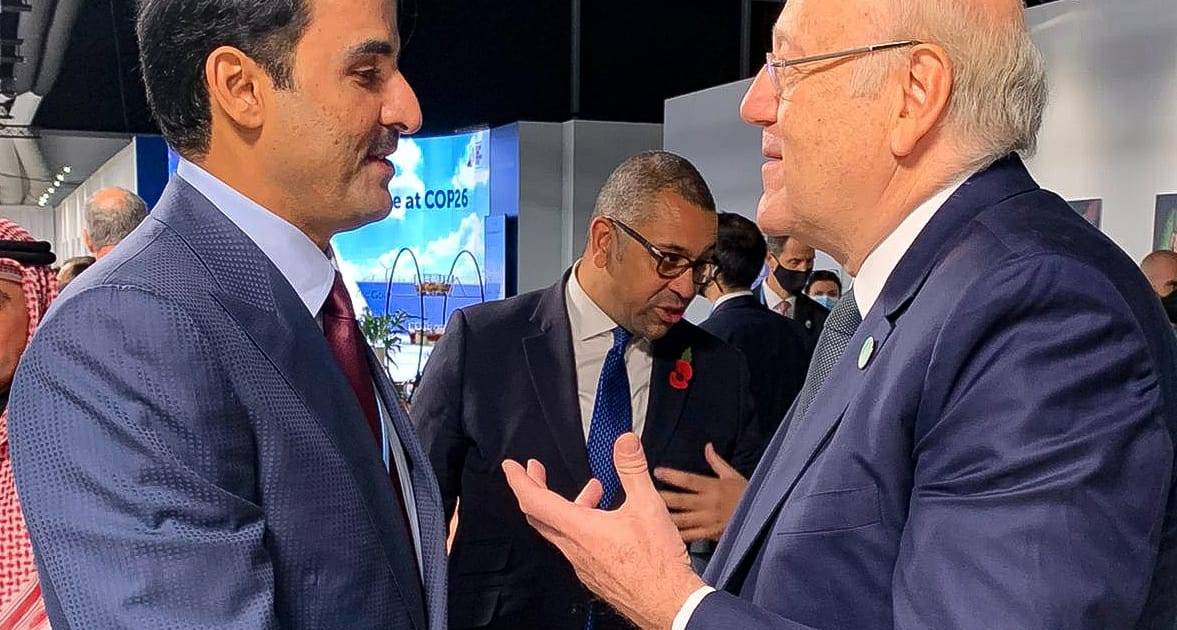The Lebanese Prime Minister said that the Emir of the State of Qatar, Sheikh Tamim bin Hamad Al Thani, will send the Qatari Foreign Minister to Beirut to search for ways to address the Lebanese-Gulf crisis, while the Lebanese Foreign Minister said that his government remains with international support despite the crisis provoked by Information Minister George Kordahi's statements regarding the war. Yemen, and the role of the Saudi-led coalition in it.
The media office of Lebanese Prime Minister Najib Mikati stated that a meeting between the Emir of Qatar and Prime Minister Mikati was held on the sidelines of the United Nations Conference on Climate Change in Glasgow, where they discussed relations between the two countries.
A statement issued by Mikati's media office added that Sheikh Tamim said that he would send Foreign Minister Sheikh Mohammed bin Abdul Rahman Al Thani to Beirut soon to discuss ways to support Lebanon, and to complete the research on the issues raised, especially dealing with the Lebanese-Gulf crisis.
The statement added that Mikati thanked the Emir of Qatar for his supportive stance on Lebanon.
2/10 In this context, President Mikati met with the Emir of Qatar, Sheikh Tamim bin Hamad Al Thani, and they discussed bilateral relations between the two countries.
During the meeting, the Emir of Qatar confirmed that he would send the Minister of Foreign Affairs, Sheikh Mohammed bin Abdul Rahman Al Thani, to Beirut soon ... @ TamimBinHamad pic.twitter.com/EcQQz8RtwQ
— Presidency of the Council of Ministers 🇱🇧 (@grandserail) November 1, 2021
The origin of the crisis
The crisis erupted as a result of Qardahi's statements in an interview broadcast last Monday, which was recorded before his appointment as a minister last September, in which he saw that the Houthis in Yemen were defending themselves in the face of external aggression from Saudi Arabia and the UAE.
Following Qardahi's statements, Riyadh expelled the Lebanese ambassador, and banned all Lebanese imports next Friday in protest against the Lebanese minister's comments. Bahrain and Kuwait followed suit, while the UAE withdrew its diplomats from Beirut and banned its citizens from traveling to Lebanon.
The Lebanese Prime Minister said - today, Monday - that his country is "in front of a major slide" amid its escalating diplomatic dispute with Gulf countries, after statements in which the Lebanese Minister of Information, Qardahi criticized the Saudi-led coalition in Yemen, and Mikati added - according to what Al-Mayadeen TV reported - We make up for it, and we will fall into what none of us wants.”
The Lebanese official stated that he appealed to Qardahi "to give priority to his patriotism over anything else" to defuse a crisis with Saudi Arabia, adding that his appeal to the Minister of Information "was not realistically translated."
In a related context, Lebanese Foreign Minister Abdullah Bouhabib affirmed that his government remains with international support despite the crisis sparked by Minister Qardahi's statements, and he was surprised by what he described as harshness on the part of Riyadh.
Bouhabib said in an interview with the Lebanese "Al-Jadeed" channel on Sunday that the crisis cell formed by the Lebanese government to deal with the crisis of Qardahi's statements regarding the Yemen war "has ended and will not meet again."
He believed that the crisis has become "bigger than the ministries and bigger than Lebanon" due to external and internal factors, and added that there is "Saudi cruelty that we do not understand", and that the problems between any two countries are resolved through dialogue, but no dialogue took place between the two countries, as he put it.
"not included"
Earlier, Al-Jadeed channel said on its website, yesterday, Sunday, that Qardahi assured her that his "resignation from the government is out of the question", without any details.
On the other hand, Saudi Foreign Minister Prince Faisal bin Farhan said that what happened cannot be described as a crisis, and made it clear that his country believes that dealing with the Lebanese government at the present time is "unproductive and useless."
And he continued - in an interview with the American network "CNBC", which was broadcast on Sunday - that Saudi Arabia has reached "the conclusion that dealing with the current government of Lebanon is not fruitful, with Hezbollah continuing to dominate the political arena."
As well as "with what we see reluctance by the current government and Lebanese political leaders in general in implementing the necessary reforms and in taking the necessary measures to push Lebanon in the direction of real change," according to his statements.
For his part, US Secretary of State Anthony Blinken announced - in a tweet on Twitter - that he discussed with his Saudi counterpart Prince Faisal bin Farhan "the situation in Lebanon, and the need to immediately restore the transitional government led by civilians in Sudan," in a meeting held yesterday, Sunday, on the sidelines of the meeting. Their participation in the G20 summit in Rome.

